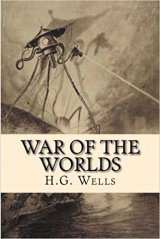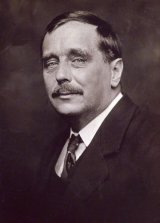The War of the Worlds Page #12
The War of the Worlds is a science fiction novel by English author H. G. Wells first serialised in 1897 by Pearson's Magazine in the UK and by Cosmopolitan magazine in the US.
So much I saw then, all vaguely for the flickering of the lightning, in blinding highlights and dense black shadows. As it passed it set up an exultant deafening howl that drowned the thunder--"Aloo! Aloo!"--and in another minute it was with its companion, half a mile away, stooping over something in the field. I have no doubt this Thing in the field was the third of the ten cylinders they had fired at us from Mars. For some minutes I lay there in the rain and darkness watching, by the intermittent light, these monstrous beings of metal moving about in the distance over the hedge tops. A thin hail was now beginning, and as it came and went their figures grew misty and then flashed into clearness again. Now and then came a gap in the lightning, and the night swallowed them up. I was soaked with hail above and puddle water below. It was some time before my blank astonishment would let me struggle up the bank to a drier position, or think at all of my imminent peril. Not far from me was a little one-roomed squatter's hut of wood, surrounded by a patch of potato garden. I struggled to my feet at last, and, crouching and making use of every chance of cover, I made a run for this. I hammered at the door, but I could not make the people hear (if there were any people inside), and after a time I desisted, and, availing myself of a ditch for the greater part of the way, succeeded in crawling, unobserved by these monstrous machines, into the pine woods towards Maybury. Under cover of this I pushed on, wet and shivering now, towards my own house. I walked among the trees trying to find the footpath. It was very dark indeed in the wood, for the lightning was now becoming infrequent, and the hail, which was pouring down in a torrent, fell in columns through the gaps in the heavy foliage. If I had fully realised the meaning of all the things I had seen I should have immediately worked my way round through Byfleet to Street Cobham, and so gone back to rejoin my wife at Leatherhead. But that night the strangeness of things about me, and my physical wretchedness, prevented me, for I was bruised, weary, wet to the skin, deafened and blinded by the storm. I had a vague idea of going on to my own house, and that was as much motive as I had. I staggered through the trees, fell into a ditch and bruised my knees against a plank, and finally splashed out into the lane that ran down from the College Arms. I say splashed, for the storm water was sweeping the sand down the hill in a muddy torrent. There in the darkness a man blundered into me and sent me reeling back. He gave a cry of terror, sprang sideways, and rushed on before I could gather my wits sufficiently to speak to him. So heavy was the stress of the storm just at this place that I had the hardest task to win my way up the hill. I went close up to the fence on the left and worked my way along its palings. Near the top I stumbled upon something soft, and, by a flash of lightning, saw between my feet a heap of black broadcloth and a pair of boots. Before I could distinguish clearly how the man lay, the flicker of light had passed. I stood over him waiting for the next flash. When it came, I saw that he was a sturdy man, cheaply but not shabbily dressed; his head was bent under his body, and he lay crumpled up close to the fence, as though he had been flung violently against it. Overcoming the repugnance natural to one who had never before touched a dead body, I stooped and turned him over to feel for his heart. He was quite dead. Apparently his neck had been broken. The lightning flashed for a third time, and his face leaped upon me. I sprang to my feet. It was the landlord of the Spotted Dog, whose conveyance I had taken. I stepped over him gingerly and pushed on up the hill. I made my way by the police station and the College Arms towards my own house. Nothing was burning on the hillside, though from the common there still came a red glare and a rolling tumult of ruddy smoke beating up against the drenching hail. So far as I could see by the flashes, the houses about me were mostly uninjured. By the College Arms a dark heap lay in the road. Down the road towards Maybury Bridge there were voices and the sound of feet, but I had not the courage to shout or to go to them. I let myself in with my latchkey, closed, locked and bolted the door, staggered to the foot of the staircase, and sat down. My imagination was full of those striding metallic monsters, and of the dead body smashed against the fence. I crouched at the foot of the staircase with my back to the wall, shivering violently. CHAPTER ELEVEN AT THE WINDOW I have already said that my storms of emotion have a trick of exhausting themselves. After a time I discovered that I was cold and wet, and with little pools of water about me on the stair carpet. I got up almost mechanically, went into the dining room and drank some whiskey, and then I was moved to change my clothes. After I had done that I went upstairs to my study, but why I did so I do not know. The window of my study looks over the trees and the railway towards Horsell Common. In the hurry of our departure this window had been left open. The passage was dark, and, by contrast with the picture the window frame enclosed, the side of the room seemed impenetrably dark. I stopped short in the doorway. The thunderstorm had passed. The towers of the Oriental College and the pine trees about it had gone, and very far away, lit by a vivid red glare, the common about the sand pits was visible. Across the light huge black shapes, grotesque and strange, moved busily to and fro. It seemed indeed as if the whole country in that direction was on fire--a broad hillside set with minute tongues of flame, swaying and writhing with the gusts of the dying storm, and throwing a red reflection upon the cloud-scud above. Every now and then a haze of smoke from some nearer conflagration drove across the window and hid the Martian shapes. I could not see what they were doing, nor the clear form of them, nor recognise the black objects they were busied upon. Neither could I see the nearer fire, though the reflections of it danced on the wall and ceiling of the study. A sharp, resinous tang of burning was in the air. I closed the door noiselessly and crept towards the window. As I did so, the view opened out until, on the one hand, it reached to the houses about Woking station, and on the other to the charred and blackened pine woods of Byfleet. There was a light down below the hill, on the railway, near the arch, and several of the houses along the Maybury road and the streets near the station were glowing ruins. The light upon the railway puzzled me at first; there were a black heap and a vivid glare, and to the right of that a row of yellow oblongs. Then I perceived this was a wrecked train, the fore part smashed and on fire, the hinder carriages still upon the rails.
Translation
Translate and read this book in other languages:
Select another language:
- - Select -
- 简体中文 (Chinese - Simplified)
- 繁體中文 (Chinese - Traditional)
- Español (Spanish)
- Esperanto (Esperanto)
- 日本語 (Japanese)
- Português (Portuguese)
- Deutsch (German)
- العربية (Arabic)
- Français (French)
- Русский (Russian)
- ಕನ್ನಡ (Kannada)
- 한국어 (Korean)
- עברית (Hebrew)
- Gaeilge (Irish)
- Українська (Ukrainian)
- اردو (Urdu)
- Magyar (Hungarian)
- मानक हिन्दी (Hindi)
- Indonesia (Indonesian)
- Italiano (Italian)
- தமிழ் (Tamil)
- Türkçe (Turkish)
- తెలుగు (Telugu)
- ภาษาไทย (Thai)
- Tiếng Việt (Vietnamese)
- Čeština (Czech)
- Polski (Polish)
- Bahasa Indonesia (Indonesian)
- Românește (Romanian)
- Nederlands (Dutch)
- Ελληνικά (Greek)
- Latinum (Latin)
- Svenska (Swedish)
- Dansk (Danish)
- Suomi (Finnish)
- فارسی (Persian)
- ייִדיש (Yiddish)
- հայերեն (Armenian)
- Norsk (Norwegian)
- English (English)
Citation
Use the citation below to add this book to your bibliography:
Style:MLAChicagoAPA
"The War of the Worlds Books." Literature.com. STANDS4 LLC, 2025. Web. 10 Jan. 2025. <https://www.literature.com/book/the_war_of_the_worlds_43>.




Discuss this The War of the Worlds book with the community:
Report Comment
We're doing our best to make sure our content is useful, accurate and safe.
If by any chance you spot an inappropriate comment while navigating through our website please use this form to let us know, and we'll take care of it shortly.
Attachment
You need to be logged in to favorite.
Log In